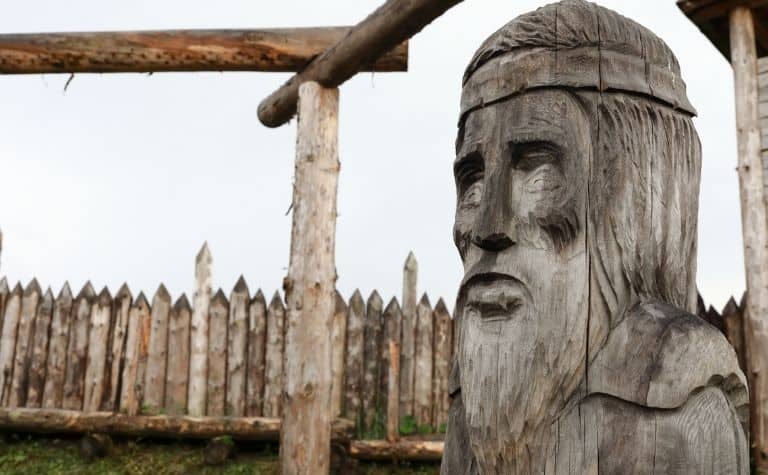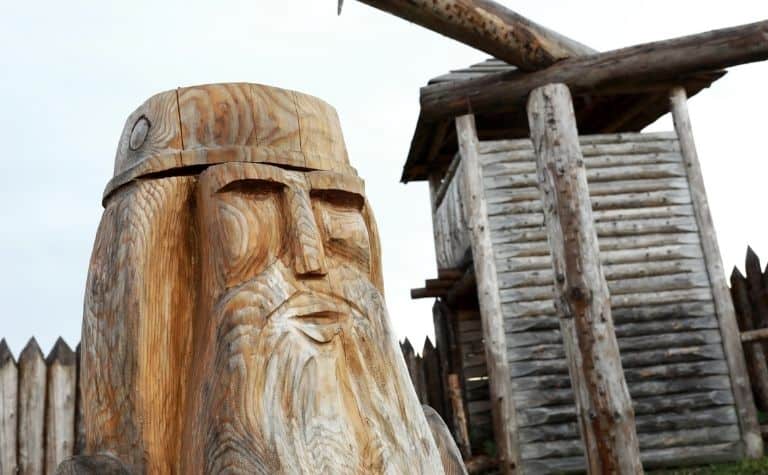Norse mythology is full of intriguing tales starring Odin, the god known as the all-father.
From the creation narrative to how he stole the mead of poetry, it seems that Odin is always out and about creating parts of the cosmos, seeking to add to his formidable intellect or simply doing mischievous things.
So, where does Odin live when he is not performing his godly duties?
Odin considers Asgard, the realm of the Aesir gods and one of the nine worlds of the Norse cosmos, to be his home.
As far as his residences, Odin has several, but Valhalla, often referred to as Odin’s Hall, is where he spends precious time with his einherjar to prepare for the arrival of Ragnarok.
Despite its majestic appearance and breathtaking proportions, Valhalla exists but for a singular purpose as Odin and his einherjar prepare for an apocalyptic battle that the fates had determined long prior would be Odin’s doom.
Ragnarok has but one outcome, and for all but a select few, annihilation is a certainty. And in classic Viking fashion, Odin and company would not have it any other way. Here’s why.

Does Odin Live in Valhalla?
Although he is just as likely to be found wandering about in his never-ending quest for more knowledge, the all-father Odin is closely associated with Valhalla, the majestic structure in Asgard with spears for rafters and shields for roof tiles.
The Vikings were firm believers in the afterlife, and of all the possible destinations in the Norse hereafter, Valhalla was the one that all warriors aspired to enter.
Commonly referred to as Odin’s Hall, Valhalla is known as such not only because of its namesake host and most prominent resident but more significantly because it is he who assembles the personal army that Valhalla houses. [1]
He is also the one who charges from its doors, leading thousands of einherjar to fight the battle to end all battles at Ragnarok, the Norse end of days. (Also see Did Female Vikings Go to Valhalla?)
Does Odin Choose Who Enters Valhalla?
Although, in reality, only a small percentage of Vikings ever wielded an axe or sword in battle, theirs was a warrior society.
It can be argued that what made the Norsemen such formidable combatants was their unflinching courage when confronted with harrowing circumstances.
In other words, they were willing to battle against any enemy and against all odds because they were unafraid of death.
What made the Vikings so accepting of death in battle was a combination of two deeply held beliefs. (Also see Did the Vikings Worship Odin?)
The Vikings Believed in Fate and Destiny
The Vikings believed that every living being’s existence was predetermined from birth by the three Norns, who were the female personifications of:
- The past
- The present
- The future [2]
No one, not even the gods, could change their destiny once it was foretold by the Norns.
As such, Viking warriors went into battle believing that if indeed it was their time to die, there was no point in despairing over it.
Rather, the only proper and honorable thing to do would be to fight with the utmost fervor and let fate take its course.
And if death on the battlefield was to be the outcome, it was the wish of every Viking warrior to wake up and find himself alongside other fallen comrades in Valhalla. (Also see Did Vikings Have to Die with Sword in Hand to Reach Valhalla?)

Odin Chooses the Vikings to Join Him in Valhalla
Being one responsible for completing the ranks of the einherjar that will one day charge from the 540 doors of Valhalla alongside Odin to meet Fenrir and the giants at the apocalyptic battle known as Ragnarok is not a task to be taken lightly. (Also see Valhalla vs Asgard: What’s the Difference?)
While there are no hard and fast rules to determine which fallen Vikings will enter Odin’s Hall of the Slain, given the arduous task at hand, simple prudence dictates that they would be elite fighters. [3]
According to Norse mythology, Odin and his Valkyries have their pick from half of those who die in battle (the other half go to Folkvangr, another destination in the afterlife that is overseen by Odinś wife, Freya). [4]
While it is widely accepted that only those who live nobly and die fighting valiantly will awaken in Valhalla, there is a question of whether Odin & Co. choose or determine members of his einherjar.
There are sources suggesting that Odinś influence goes far beyond simply choosing from fallen Vikings when assembling his personal army, as exemplified by the following:
- The outcome of every battle waged between men in the human realm of Midgard is predetermined by Odin, who then dispatches his Valkyries to choose the most courageous among the fallen [5]
- With Odin’s approval, the Valkyries weave the fate of each warrior using their magical loom (consisting of thread made from intestines and severed heads for weights) to determine which fighters will live and which will die, presumably to recruit the very best combatants to join Odin’s army [6]
- Hovering over the battlefield as the fighting rages on, Odin’s Valkyries reputedly go so far as to shield certain Vikings from harm while directing others to their violent demise
It would seem that Odin and his Valkyries did more than simply choose their lot from Vikings who died in battle. In reality, they may have been responsible for deciding which warriors lived and who died.
Will Odin Survive Ragnarok?
The Vikings believed deeply in the concept of fate and were accepting of all fortunes, good or bad. [7] According to Norse mythology, no one can escape or change the future that has been foretold for them.
This applies not only to humankind but to the gods as well. And perhaps no being knew the consequences of fate more intimately or tragically than the father of all Norse gods, Odin.
The word Ragnarok is Old Norse for ¨fate of the gods,¨ and in Odin’s case, fate was to deal him a double blow:
- One of the signs foretold by the Norns, of the arrival of Ragnarok, is the tragic death of Baldr, beloved god, and son of Odin and Frigg
- According to the same prophecy, Odin, his einherjar, and virtually the entire pantheon of Aesir gods, including his son Thor will perish during Ragnarok (but thankfully, according to most Ragnarok narratives, the few survivors will settle in a new world where order is restored and chaos is at last vanquished) [8]
Not even the Norse all-father, creator of humankind and the cosmos, can alter his doubly tragic fate, and he will heroically carry on to lead his einherjar into their final, epic battle. (Also see Do People Still Believe In Odin?)
How Does Odin Die?
Despite knowing full well what apocalyptic events the arrival of Ragnarok portends for him and nearly all life forms in the Norse universe, Odin, his Aesir brothers and sisters, and the formidable einherjar will charge into battle, unified in spirit and purpose against:
- Loki
- Fenrir
- Jormungand
In classic Viking fashion, Odin and company know that they cannot alter their fate but are still determined they will fight the good fight. As it pertains to Odin specifically, this is how the events of Ragnarok will unfold:
- It was foretold that Odin would face his greatest nemesis, Fenrir the great wolf, during Ragnarok
- After years of being fettered by enchanted shackles, the monstrous Fenrir breaks free to join forces with his sibling Jormungand and their father, Loki
- Standing before the gargantuan jaws of Fenrir, Odin and his einherjar will be devoured by the devilish creature
- As was foretold by the Norns, Odin will be avenged by his son Vidar, who will pry open the beastś jaws with magical boots and plunge a sword into its throat
Odin tragically will not survive his battle against Fenrir but can find solace in knowing, before Ragnarok even begins, that a new world order will emerge from the devastation.
Who is Odin to the Vikings?
One would imagine the godliest of Norse gods sitting majestically on his throne, overseeing the entirety of Midgard, the realm of humankind.
On the contrary, Odin is anything but a stately figure. Rather, he is an enigmatic deity whose powers are unquestionably beyond compare but whose personality quirks and obsessive behavior have made him one of the most endearing figures in all of Norse mythology. [9]
He is most often depicted as wearing a long, loose-fitting cloak and wizard’s hat to go along with his scraggly beard.
In truth, Odin was the wearer of many hats, as evidenced by the numerous godly names and titles bestowed upon him. Here are just a few examples:
- First and foremost, Odin is the god of wisdom, as exemplified by his sacrifice of one of his eyes in exchange for a sip from the Well of Urd (also known as Mimirś Well) and the deep enlightenment that it imparted
- He is also the god of runes and famously hung himself from Yggdrasil (the tree of life) for nine days and nights in order to unlock their secrets
- Odin is the god of poetry and the tale of how he stole the mead of poetry from the giant Suttung and shared it with humankind
- As the overseer of Valhalla and its army of einherjar, Odin is also considered by the Vikings to be the god of war and of death [10]
Odin represented so many things to the Vikings, from esoteric matters of intellect to the disposition of warriors’ souls, that above all else, his title as the all-father is perhaps the most fitting. (Also see Norse Mythology vs Egyptian Mythology: What’s the Difference?)
Final Thoughts
Fate will deny him the opportunity to see order restored after Ragnarok, but the central role of Odin in Norse mythology cannot be overstated.
References:
[1] Source
[2] Source
[3] Source
[4] Source
[5] Source
[6] Source
[7] Source
[8] Source
[9] Source
[10] Source
